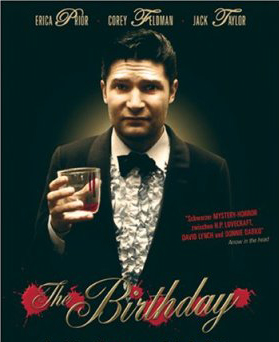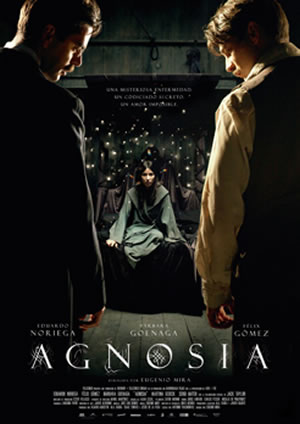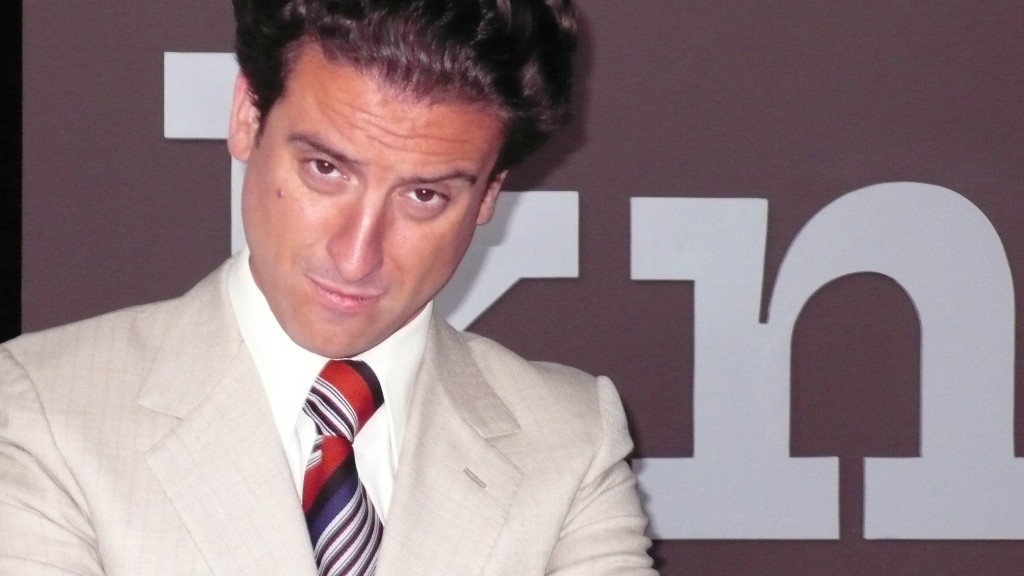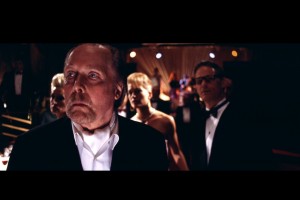YOU TALKIN’ TO ME?
YOU TALKIN’ TO ME?
Spanish director Eugenio Mira talks about Jack Taylor, Corey Feldman, Robert DeNiro and the current state of Spanish genre cinema
——————
Eugenio Mira is one of the most hyperactive and excitable people I’ve ever met. The young director of opulent cult oddity The Birthday (2004) starring eccentric 80s posterboy Corey Feldman and the recent period drama Agnosia (2010) starring stunning Spanish superstar Eduardo Noriega (Thesis, Open your Eyes, The Devil’s Backbone) – both of which also feature gentlemanly Jess Franco staple Jack Taylor – Mira is an ardent cinephile who talks price of propecia from canada a mile a minute in a type of broken English that seems gleaned from ancient occult texts, oozes enthusiasm from every pore and generally lives life as though he is improvising a convoluted metacinematic stand-up routine. Aside from his own projects, which are obsessively detailed and thematically complex, Mira has also been second unit director on some of the biggest Spanish genre films of late, including Rec 2 (2009) and The Orphanage director Juan Antonio Bayona’s untimely tsunami disaster pic The Impossible (upcoming). But his strangest credit of all may be his unexpected debut as an actor, playing a young Robert DeNiro in Rodrigo Cortez’ Red Lights, which is due out next year. Mira spoke to Spectacular Optical about his rewarding lifelong with relationship with film and the opportunities afforded by the latest Spanish genre resurgence.
———————
Tell me about working with Corey Feldman on The Birthday. Teaming him up with genre giant Jack Taylor has to be one of the weirdest and most inspired casting decisions ever.
 It was the fulfillment of a dream. I mean, The Birthday was about taking a particular universe that amazed me as a kid to a different dimension. That particular universe was that of Spielberg, levitra 20mg side effects Donner, Landis, Dante and Zemeckis. And I wanted to play in that yard, respecting some female viagra next day delivery of the rules and breaking others. The generation of my masters grew up with Rod Serling’s The Twilight Zone, Hammer films and Ackerman’s Famous Monsters magazine, so I guess that I instantly recognized in Jack Taylor the perfect totem to render the spell of that particular mood of the 20th century. He’s an actor with a whole universe on his back. He’s a demi-god, OK? Think of Peter Cushing, Vincent Price and Christopher Lee… and beyond. He transcends trends and paradigms. And I needed that. I’m so fortunate to have had his presence and talent to bring the character of Ron Fulton to life as the multi-layered arch-enemy of Corey Feldman’s character… because The Birthday is all about transmutations. What changes and what persists. Paradigms shifting before your eyes, in real time. So the condiments had to have their own pre-built value.
It was the fulfillment of a dream. I mean, The Birthday was about taking a particular universe that amazed me as a kid to a different dimension. That particular universe was that of Spielberg, levitra 20mg side effects Donner, Landis, Dante and Zemeckis. And I wanted to play in that yard, respecting some female viagra next day delivery of the rules and breaking others. The generation of my masters grew up with Rod Serling’s The Twilight Zone, Hammer films and Ackerman’s Famous Monsters magazine, so I guess that I instantly recognized in Jack Taylor the perfect totem to render the spell of that particular mood of the 20th century. He’s an actor with a whole universe on his back. He’s a demi-god, OK? Think of Peter Cushing, Vincent Price and Christopher Lee… and beyond. He transcends trends and paradigms. And I needed that. I’m so fortunate to have had his presence and talent to bring the character of Ron Fulton to life as the multi-layered arch-enemy of Corey Feldman’s character… because The Birthday is all about transmutations. What changes and what persists. Paradigms shifting before your eyes, in real time. So the condiments had to have their own pre-built value.
About setting the movie in 1987 and calling Corey Feldman to play the protagonist… look, I’m not gonna say that we were happier in the First World during the 80’s, but at least there was a tangible effort to focus on the positive. Deeply naive, sometimes, maybe… but you can’t say the system didn’t try. With the 90’s, everything changed. It’s as if the system anticipated that people were gonna notice that our way of life was based on advertising, or, even worse, on propaganda. Before we reached the logical hangover, the system took conscience of itself and planted in the mainstream the seeds of hatred and frustration, kind of like a self-fulfilling prophecy. The tagline was “Are you pissed off? Tell me about it!”. That’s why Nirvana and hip hop spread the way they did. It wasn’t an accident. It was consented to and promoted from the top of the pyramid. You could say the system invoked the monster. And yes, that’s the heart of The Birthday: From heaven to hell in 117 minutes.
So… what a better actor than Corey Feldman to incarnate the “birth of Generation X”? Look at his career, the currency of his brightness, canned forever in the 80’s. Jack and Corey perfectly played out the coexistence of two opposite frequencies, vibrating simultaneously in the same universe. That’s the key transmutation I wanted to render: from the decline of the spirit of the Golden Age to the birth of the New World Order. Look at the world today. I’m not gonna say that I saw it coming in a crystal ball… but sometimes it gives me the creeps to watch the news. It’s as if we are living in a world where the monster has won.
What amazes me is that we shot the movie in 2004. I was 26. Corey Feldman was 34. And yes, he was an icon of the 80’s, he played in my master’s yard, he knew the rules… and that happened not so long ago. Corey was definitely more in the mood to try something different than to make a “comeback” to an already obsolete system. So I not only met the icon, I met the actor and the bold filmmaker. He loves cinema. And he loves making movies. He understood my goals better than anybody else since day one. So when somebody asks me about Mr. Feldman, I always try to distinguish the legend and the actor from my friend and collaborator. I admire the guy, let me tell you.
Can you tell me about your collaborations with Jack Taylor? Why do you think he’s been so much more welcomed in Spain that in his home country the US?
I fell in love with Jack the first day I met him in a famous cafeteria in Madrid: El Café Comercial. We had a terrific chat and it was obvious that we were on the same page. He saw in The Birthday “a Blake Edwards script in the hands of Roman Polanski”. Imagine my reaction! I always said that director’s job is all about winning the confidence of the talent and the effort of your collaborators. Jack made me feel safe from the beginning to the last shot. And I will never forget that. His confidence and kindness is contagious. The whole crew loved him. In the particular case of Agnosia, I required his presence to jump into a different kind of arena. I needed him so much. His incarnation of Doctor Meissner is one of those characters you can’t take out of your head. It has that iconic power I made reference to before. I hope to team up again with Jack. I guess I can’t get enough of him!
Concerning Jack’s warm welcome in the Spanish film industry, I think that it has to do with two elements. First, Jack wanted to see the world outside of Oregon. I think he went to Mexico when he was like 19 years old. He had a natural fascination with Spanish culture. After spending some years in several countries in South America, he went to Spain and he found his place as a “cosmopolitan” actor. Those where the Jess Franco years. He worked in all those movies across Europe. He always embraced that idea of a being traveller. He’s a 21st Century adventurer. He loves to observe. He’s a connoisseur. And he’s living that dream. On the other hand, he landed in Spain at the right time. There was this revolution in this particular genre, and Jack fit like a glove. He can play an American, a British, a Swede, a German… you name it. And he’s a multidisciplinary man, so… I guess it was written somewhere. Funny to think his destiny pointed to me. What an honour.
(the following video was shot and edited in-camera at the 2005 CineMuerte Film festival, where Eugenio Mira and Jack Taylor presented The Birthday)
As a fan what’s your favourite Jack Taylor performance, apart from your own films?
I think that the first time I went bananas with Jack was with Succubus. He’s so elegant and mysterious in that one. I was into Fellini and Buñuel those days, and a friend recommended the movie to me. I loved it. Jack was so full of mojo. Like warm and cold at the same time. As if you look into his eyes for too long you could fall in a whirlpool full of banshees or something. From there on, every single time I stumbled into him I always enjoyed his work. But the reason his named popped up in my head for The Birthday was because of his role in Roman Polanski’s The Ninth Gate. He shares a couple of scenes with Johnny Depp and… he’s amazing. I think that I’m kind of obsessed with that movie. I agree with everybody who says it’s not one of Polanski’s best… but the more you see it, the more details you find. Maybe it is the ritual thing, the assumption that some individuals know stuff most of us don’t. Jack got it all right. He’s perfect in that movie. I strongly recommend you to revisit his charms in that one!
Your film Agnosia is a total departure from The Birthday – although both have equally lavish production design. In particular, the humour and absurdity of The Birthday is gone in favour of a more straight melodramatic story — what was it that inspired this shift?
Well, as a film director, I’m fascinated with different genres, in the same way that as a musician I love diverse styles and rules to play with, from Prokofiev to Minor Threat. In this particular case, I wanted to build up this operatic melodrama, this bigger-than-life love story wrapped in a Hitchcockian thriller that I pictured as being closer to Visconti than Brian De Palma. Keep in mind that The Birthday was like saying hello and goodbye to the movies I grew up with as a spectator and as a filmmaker. With Agnosia, I wanted to go deep in my roots as a Southern European kid. Antonio Trashorras (the writer) and I used to say we were making the first “Mediterranean Gothic tale” ever! And we loved that premise. I think that the style of a filmmaker has to survive different genres and industrial contexts.
Tell me about the illness agnosia.
 Agnosia is the loss of the capacity to recognize sounds, shapes, smells… pretty much everything surrounding you. If you can’t recognize something you have already recorded in your brain, you’re completely lost. We thought it was a great concept for a thriller, but on the other hand, we were instantly more interested in the consequences of the illness in the characters’ lives than in the film’s espionage elements. That’s why the first half of the movie is so mysterious. We didn’t want the audience to be two steps beyond the characters after the second half of the movie. That’s tricky, because suspense is about giving advantage to the audience from the beginning, so we ran the risk of being confusing instead of mysterious. But that was our bet. After all, the movie is about “not being able to know”. That’s what agnosia means, literally.
Agnosia is the loss of the capacity to recognize sounds, shapes, smells… pretty much everything surrounding you. If you can’t recognize something you have already recorded in your brain, you’re completely lost. We thought it was a great concept for a thriller, but on the other hand, we were instantly more interested in the consequences of the illness in the characters’ lives than in the film’s espionage elements. That’s why the first half of the movie is so mysterious. We didn’t want the audience to be two steps beyond the characters after the second half of the movie. That’s tricky, because suspense is about giving advantage to the audience from the beginning, so we ran the risk of being confusing instead of mysterious. But that was our bet. After all, the movie is about “not being able to know”. That’s what agnosia means, literally.
What really comes across about you is that you are first and foremost a fan – why do you think your childhood enthusiasm for movies has never dissipated?
I had a terrific childhood. And I’m staying away from witchcraft as much as I can, so 90% of what happens to me is a natural blend of effort, determination and plain and pure luck. I could die tomorrow and my life would’ve been 100 times more amazing than the average human being’s lifetime experience on the face of this planet. Just because I’m grateful for that, it encourages me to keep pushing the envelope. I was born in the 20th century, like yourself. We have pop culture. I need to give something in return. Because I received soooo much, you know?
Tell me a bit about your second unit work on The Impossible and Rec 2 – didn’t you also have something to do with The Backwoods? Do all you Spanish genre guys pal around with each other?
I loved the experience of spending 4 months in Thailand [on The Impossible]. My skin is still tanned! I had a crew of 30 to 40 people just for myself. We made a lot of incredible shots. I even had the chance to give instructions to Ewan McGregor in a couple of scenes!! All I have is great words for director J.A. Bayona and his producer, Belén Atienza. I love to work with my generational counterparts. Half a decade ago I realized it would be very sad to belong to a generation that only comes together conceptually in a distant future, when somebody writes a book about this particular era in Spanish cinema history. I wanted to change that potential future, so after stumbling across my counterparts in several film festivals and premieres here and there, I decided to make a step forward. I deliberately started to interconnect every one of us. Writers, musicians, directors, cinematographers… everybody. As long as I have my own career as a filmmaker, I wanted to reduce my job as a technician to collaborations with filmmakers I admired. That’s why I ended up making the soundtrack for Nacho Vigalondo’s Timecrimes or shooting stuff for Paco [Plaza] and Jaume [Balaguero] in Rec 2. In the particular case of Koldo Serra’s The Backwoods, I’m afraid I only had the chance to shoot a stupid, cute, totally improvised short film on set. It’s called Big and Small, and it almost caused me to get my ass thrown out of the shoot. Koldo’s first assistant director couldn’t stand me. And I agree with him. Shooting a short film during the shoot of a movie is… highly inopportune. But Koldo and I are fine. We love each other. And I’d do whatever he asks of me in the future (that includes abandoning the set!).
In an already colourful and varied career, the weirdest twist has to be your recent casting as an actor in Rodrigo Cortez’ forthcoming Red Lights – as a young Robert DeNiro! Tell me about this experience. (note: his answer here mirrors that which has appeared on other websites regarding this subject)
It becomes clear to me that I must be some kind of magnet for the improbable, because otherwise, somebody must be playing with my destiny from another dimension, like in a videogame or something.
Back in October, it was announced that Robert De Niro was gonna be playing a mentalist/psychic magician in Rodrigo Cortes’ Red Lights. I’ve been stumbling upon Rodrigo over the last couple years, so I had the chance to read his script before he made Buried. That’s why I remembered there was a section of the story where a younger version of Robert De Niro’s character was portrayed. I couldn’t resist, so – despite the fact that I never planned to have an acting career – I just wrote Rodrigo saying “hey, I think I can pull it off!”. He answered cautiously and warmly with an “LOL”.
Next time I had news of Red Lights, it was via Ronna Kress, the casting director!! Oh my God. No jokes here: it was ON!! I started to feel the challenge. Of course, they’d have to dub me… but even so, I had to get as close as I could to De Niro’s voice and accent. So I started to practice. Keep in mind that all this happened while I was in Thailand, shooting the 2nd unit of J.A. Bayona’s The Impossible, starring Ewan McGregor and Naomi Watts. So I grabbed a camera, I built a little set in my hotel room and I asked a friend to play “a 70’s tv show presenter”. I edited it and I sent it to Ronna.
She loved it. I was AMAZED. Now, I only had to wait until Christmas to know the decision. They had to check all the audition tapes. I suddenly was aware that I was competing with true professional actors from London and L.A. I kept the faith, but my brain was telling me “no way”.
Adrian Guerra (the producer) calls me the first week of January and he literally says: “You’re pretty close, man. Now there is only one more step: we have to show it to Mr. De Niro for his final approval”.
“His final approval…”
It happened. And I can’t believe it, still.
48 hours in Barcelona and back to Thailand. The Bobby-D day was the 4th. The day two guys play the same character. The day I made my debut as an actor. The day I met the myth, the icon and the man. So kind, warm… and shy! Unforgettable.
To what extent is the average Spanish person familiar with their national genre film heritage?
The closest we’ve ever been to having our own Twilight Zone was back in the 60s with Narcisco Ibañez Serrador’s Historias para No Dormir (“Stories to keep you asleep”). That TV series captured the imagination generation before mine, the one Alex De La Iglesia, Juanma Bajo Ulloa and Enrique Urbizu belong to. It wasn’t until the late 70’s/ early 80’s when we started to see American stuff like Alfred Hitchcock Presents or V, so I guess it never build up a strong influence. It was the VHS explosion what allowed us to “catch up” in some way with what we missed. So unfortunate, if I do say so myself.
Do you think the Spanish industry is going through a high period again right now, similar to what was happening in the late 90s with the New Spanish Fantastic?
Honestly, I think it’s even bigger. Directors like Juan Carlos Fresnadillo (28 Weeks Later) J.A. Bayona (The Orphanage), Nacho Vigalondo (Timecrimes), Jaume Collet-Serra (The Orphan), Koldo Serra (The Backwoods), Luiso Berdejo (The New Daughter), Paco Plaza and Jaume Balagueró (REC), M.A. Vivas (Secuestrados) and Rodrigo Cortés (Red Lights) are here to stay. I’m very excited, let me tell you, not only as a filmmaker, but as a spectator. Even though I don’t see the future of the film industry (and the world’s economy) with good eyes, something tells me that our enthusiasm is bomb-proof. So we’re gonna prevail. How? We’ll figure out.
——————-
– Interview by Kier-La Janisse

 May 1, 2011
May 1, 2011  No Comments
No Comments




